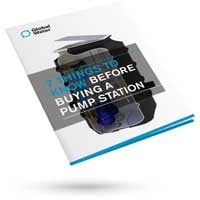When to select a grinder pump for a pump station?
Submersible grinder pumps are a submersible macerator pump that can be applied in many applications, from residential houses to commercial shopping centres and even municipal recreational areas. They come in various ranges and sizes depending on the duty required and are available in single and three phase options making grinder pumps the preferred macerating pump.

Grinder pumps are specialised equipment designed to handle specific challenges in wastewater management. Muhammad Khan, a member of the pumping systems team at Global Water, explains the key situations where a grinder pump is the optimal choice:
Q. When wastewater contains large or challenging solids, is a grinder pump the best option?
Muhammad: Yes, grinder pumps are ideal for handling materials such as rags, paper towels, food scraps, and sanitary products. These pumps efficiently shred solid waste into smaller particles, allowing it to flow smoothly through the system and reducing strain on downstream components.
Q. Can a grinder pump improve performance in systems with small-diameter pipes?
Muhammad: Absolutely. Small pipes can struggle to transport wastewater with larger particles. Grinder pumps ensure smooth operation by transforming waste into a manageable slurry, supporting consistent flow through narrow piping systems.
Q. Are grinder pumps effective for long-distance or high-elevation pumping?
Muhammad: They are! Grinder pumps are designed to generate high-pressure output, enabling wastewater to be transported efficiently across extended distances and to higher elevations, where standard pumps may fall short.
Q. How do grinder pumps handle fibrous or tough materials in wastewater?
Muhammad: Wastewater often contains difficult materials like hair, grease, and fibrous items. A grinder pump prevents these substances from causing performance issues by breaking them down into finer particles that flow easily thorugh the system.
Q. Are grinder pumps suitable for residential and commercial applications?
Muhammad: Yes, grinder pumps suitable for both applications. They are commonly used in homes, businesses, and smaller municipal systems where mixed waste streams are common. They keep these systems operating efficiently by managing a wide variety of waste materials.

Q. How do grinder pumps help minimise maintenance needs?
Muhammad: Thanks to their robust construction and efficient grinding mechanisms, grinder pumps are designed for low-maintenance operation. They significantly reduce service demands, saving time and costs over the long term.
Q. Can grinder pumps protect other components in the system?
Muhammad: Yes, they can. Grinder pumps safeguard external pipework and other system components by ensuring the waste moves efficiently and avoiding performance issues. This can extend the lifespan of the entire wastewater network.
Q. Does the material of the pump station matter when choosing a grinder pump?
Muhammad: Yes, the choice of material plays a key role in system design. Polyethylene (poly) pump stations are lightweight and ideal for residential or smaller applications, especially in corrosion-prone areas. Concrete pump stations, however, are better suited for larger-scale or industrial systems due to their durability and capacity for high-volume wastewater management. Selecting the appropriate pump station material ensures compatibility with the grinder pump and the system’s operational demands.
For personalised advice on selecting the right grinder pump and components for your system or pump station packages, contact our team at Global Water today.
Tags: Submersible pumps, Wastewater, Blackwater




